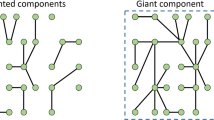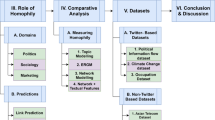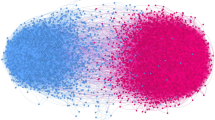Abstract
Humans are an integral part of the wide world and material areas, and morphological difference is widespread. In this paper, we propose a model to emphasize the influence of human heterogeneity to information spreading on social networks, and the properties including memory effects, social reinforcement, non-redundancy and human heterogeneity are taken into account. Simulation results indicate that the small-world networks generate the most effective spreading for the stronger human heterogeneity; however, for the weaker human heterogeneity, the regular networks will be more effective. In addition, for a given BA scale-free network, the stronger human heterogeneity will be more conducive to information spreading.



Similar content being viewed by others
References
Gilligan, T.W., Krehbiel, K.: Asymmetric information and legislative rules with a heterogeneous committee. Am. J. Polit. Sci. 33, 459–490 (1989)
Barsky, R.B., Kimball, M.S., Juster, F.T., Shapio, M.D.: Preference parameters and behavioral heterogeneity: an experimental approach in the health and retirement survey. Q. J. Econ. 112, 537–579 (1997)
Deng, Y., Quigley, J.M., Van, R.: Mortgage terminations, heterogeneity and the exercise of mortgage options. Econometrica 68, 275–307 (2000)
Bowles, S., Gintis, H.: The evolution of strong reciprocity: cooperation in heterogeneous populations. Theor. Popul. Biol. 65, 17–28 (2004)
Frey, B.S., Meier, S.: Social comparisons and pro-social behavior: testing “conditional cooperation” in a field experiment. Am. Econ. Rev. 94, 1717–1722 (2004)
Bénabou, R., Tirole, J.: Incentives and prosocial behavior. Am. Econ. Rev. 96, 1652–1678 (2006)
Hommes, C.H.: Chapter 23 heterogeneous agent models in economics and finance. In: Tesfatsion, L., Judd, K.L. (eds.) Handbook of Computational Economics, vol. 2, pp. 1109–1186. Elsevier, North Holland (2006)
Dodds, P.S., Watts, D.J.: Universal behavior in a generalized model of contagion. Phys. Rev. Lett. 92, 218701 (2004)
Medo, M., Zhang, Y.C., Zhou, T.: Adaptive model for recommendation of news. Eur. Phys. Lett. 88, 38005 (2009)
Cimini, G., Medo, M., Zhou, T., Wei, D., Zhang, Y.C.: Heterogeneity, quality, and reputation in an adaptive recommendation model. Eur. Phys. J. B 80, 201–208 (2011)
Wei, D., Zhou, T., Cimini, G., Wu, P., Liu, W., Zhang, Y.C.: Effective mechanism for social recommendation of news. Phys. A 390, 2117–2126 (2011)
Prapivsky, P.L., Redner, S., Volovik, D.: Reinforcement-driven spread of innovations and fads. J. Stat. Mech. 2011, p12003 (2011)
Lü, L.Y., Chen, D.B., Zhou, T.: The small world yields the most effective information spreading. New J. Phys. 13, 123005 (2011)
Watts, D.J., Strogatz, S.H.: Collective dynamics of ‘small-world’ networks. Nature 393, 440–442 (1998)
Santos, F.C., Rodrigues, J.F., Pacheco, J.M.: Epidemic spreading and cooperation dynamics on homogeneous small-world networks. Phys. Rev. E 72, 056128 (2005)
Zhou, T., Fu, Z.Q., Wang, B.H.: Epidemic dynamics on complex networks. Prog. Nat. Sci. 16, 452–457 (2006)
Zanette, D.H.: Critical behavior of propagation on small-world networks. Phys. Rev. E 64, 050901 (2001)
Centola, D.: The spread of behavior in an online social network experiment. Science 329, 1194–1197 (2010)
Costa, L.F., Rodrigues, F.A., Travieso, G., Boas, P.R.V.: Characterization of complex networks: a survey of measurements. Adv. Phys. 56, 167–242 (2007)
Barabási, A.L., Albert, R., Jeong, H.: Scale-free characteristics of random networks: the topology of the world-wide web. Phys. A 281, 69–77 (2000)
Barabási, A.L., Albert, R.: Emergence of scaling in random networks. Science 286, 509–512 (1999)
Barabási, A.L., Jeong, H., Néda, Z., Ravasz, E., Schubert, A., Vicsek, T.: Evolution of the social network of scientific collaborations. Phys. A 311, 590–614 (2002)
Onnela, J.P., Saramäki, J., Hyvönen, J., Szabó, G., Lazer, D., Kaski, K., Kertész, J., Barabási, A.L.: Structure and tie strengths in mobile communication networks. Proc. Natl. Acad. Sci. USA 104, 7332–7336 (2007)
Acknowledgments
This work was supported by Natural Science Foundation of China under Grant Nos. 11271006, 11201440 and Shandong Provincial Natural Science Foundation of China under Grant No. ZR2012GQ002.
Author information
Authors and Affiliations
Corresponding author
Rights and permissions
About this article
Cite this article
Zhu, ZQ., Liu, CJ., Wu, JL. et al. The Influence of Human Heterogeneity to Information Spreading. J Stat Phys 154, 1569–1577 (2014). https://doi.org/10.1007/s10955-014-0924-z
Received:
Accepted:
Published:
Issue Date:
DOI: https://doi.org/10.1007/s10955-014-0924-z




